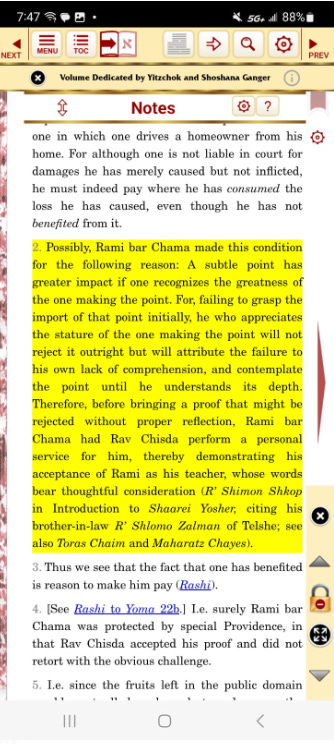Shimush, and Rami bar Chama
אֲמַר לֵיהּ רַב חִסְדָּא לְרָמֵי בַּר חָמָא: לָא הֲוֵית גַּבַּן בְּאוּרְתָּא בִּתְחוּמָא, דְּאִיבַּעְיָא לַן מִילֵּי מְעַלְּיָיתָא. אֲמַר: מַאי מִילֵּי מְעַלְּיָיתָא? אֲמַר לֵיהּ: הַדָּר בַּחֲצַר חֲבֵירוֹ שֶׁלֹּא מִדַּעְתּוֹ – צָרִיךְ לְהַעֲלוֹת לוֹ שָׂכָר, אוֹ אֵין צָרִיךְ?
§ In connection to the principle stated in the mishna, that if the animal derives benefit the owner of the animal pays for the benefit that it derived, the Gemara relates: Rav Ḥisda said to Rami bar Ḥama: You were not with us at night within our boundary when we raised dilemmas concerning exceptional matters. Rami bar Ḥama said to him: What are the exceptional matters you discussed? Rav Ḥisda said to him: With regard to one who resides in another’s courtyard without his knowledge or permission, must he pay him rent for living there or does he not need to pay him rent?
The gemara interjects and explores this a bit, then:
אֲמַר לֵיהּ: מַתְנִיתִין הִיא. הֵי מַתְנִיתִין? אֲמַר לֵיהּ: לְכִי תְּשַׁמֵּשׁ לִי. שְׁקַל סוּדָרֵיהּ כְּרַךְ לֵיהּ. אֲמַר לֵיהּ: אִם נֶהֱנֵית – מְשַׁלֶּמֶת מַה שֶּׁנֶּהֱנֵית.
Rami bar Ḥama said to him: This dilemma is not new; rather, it is discussed in the mishna, and the mishna already provided a solution. Rav Ḥisda asked him: To which mishna are you referring? Rami bar Ḥama said to him: After you serve me, I will tell you. Rav Ḥisda took hold of Rami bar Ḥama’s scarf [suderei] and folded it, as an act of service. Rami bar Ḥama then said to him: This is the mishna: If the animal derives benefit, the owner of the animal pays for the benefit that the animal derived. This demonstrates that one who derives benefit must pay for the benefit he derives, even if the injured party is not entitled to payment for his loss.
אָמַר רָבָא: כַּמָּה לָא חָלֵי וְלָא מַרְגֵּישׁ גַּבְרָא דְּמָרֵיהּ סַיְּיעֵיהּ – דְּאַף עַל גַּב דְּלָא דָּמֵי לְמַתְנִיתִין, קַבְּלַהּ מִינֵּיהּ. הַאי זֶה נֶהֱנֶה וְזֶה חָסֵר, וְהַאי זֶה נֶהֱנֶה וְזֶה לֹא חָסֵר הוּא!
Rava said: How little does a man who has the assistance of his Lord have to worry or be concerned about the possibility that his opinion may not be accepted, as even though the dilemma that was raised is in fact not similar to the case in the mishna quoted by Rami bar Ḥama, Rav Ḥisda nevertheless accepted it from him. This case in the mishna, about the animal eating produce in the public domain, is where this one derives benefit and that one suffers a loss, and that case of the squatter living in the courtyard, is where this one derives benefit and that one does not suffer a loss.
Online and in print articles, I’ve seen discussions stemming from this about the importance of shimush talmidei chachamim. And indeed, here is Artscroll’s comment:
This seems exceptionally strange to me. Rami bar Chama as Rav Chisda’s teacher?! Rav Chisda was third-generation, and Rava and Rami bar Chama were fourth-generation. Further, they were Rav Chisda’s students. Furthermore, Rami bar Chama married Rav Chisda’s daughter, and Rava married her after Rami’s death. Some of this should be mentioned in the analysis.
Rather, we aren’t dealing with the standard and serious case of shimush talmidei chachamim, or Rav Chisda accepting his student (!) as his teacher. They are joking around in a friendly fashion. I know something you don’t know, so now I am the teacher. You better acknowledge me as such, or else I won’t tell you! :) So Rav Chisda does some minor action. Then Rava, another student, says “eh”, in joking fashion, that he didn’t actually deserve this shimush, because the Mishnah doesn’t prove it.




